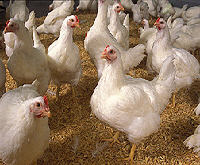



Comparative Genomics used to Manage Marek's Disease
US - The genetic code for a virulent strain of Marek's disease virus was cracked a few years ago. Now, to determine how best to cripple it and other infectious strains, Agricultural Research Service (ARS) scientists are working to decipher the genomes of several nonvirulent Marek's disease (MDV) vaccine strains. The scientists' strategy for developing better vaccines for Marek's disease is to incorporate modified versions of yet-to-be identified genes important to the virus' ability to cause disease. |
Microbiologists Stephen Spatz at the ARS Southeast Poultry Research Laboratory in Athens, Ga., and Robert Silva at the ARS Avian Disease and Oncology Laboratory in East Lansing, Mich., have teamed up to compare nonvirulent MDV strains used in vaccines.
Marek's disease is the first cancer-causing virus for which a tumor-preventing vaccine was developed. In the United States, most commercial chickens are vaccinated against Marek's disease virus type 1 (MDV1) while inside the egg. In Europe, chicks are vaccinated when they are one day old. While these very successful vaccination programs, begun in the 1960s, have saved the industry billions of dollars, the MDV problem still persists.
That's because selective pressures imposed on the virus in vaccinated birds cause new variants to evolve that could pose a threat to the poultry industry. Because the virus is constantly evolving, new vaccines have to be developed to keep them in check.
To investigate the differences between the variants, Spatz and Silva initiated a comparative genomics research program. It involves determining the DNA sequences of various strains of MDV. Some of these are nonvirulent ones used as commercial vaccines, while others cause severe disease in chickens. By examining the differences between these strains at the DNA level, the two researchers hope to identify the genes involved in virulence--that is, the virus' ability to cause disease.
Once these genes have been identified, improved vaccines containing modifications in the virulence genes can be engineered and used to protect chickens against current disease-causing MDV strains, as well as against future strains.
ThePoultrySite News Desk











